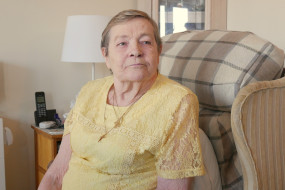CIH Scotland has welcomed the Scottish Government's new dementia strategy, Everyone’s story, which has set out a ten-year vision for dementia care in Scotland. The strategy has been followed by the first two-year delivery plan focusing on seven key deliverables for 2024-2026:
Dementia
A pioneering initiative using storytelling to encourage people to open up about their own experiences of living with dementia has been launched by Age Scotland’s dementia policy forum, About Dementia. The new Storytelling Resource is aimed at people who run groups and organisations working wit
Improving the lives of people with dementia is at the heart of a new 10-year strategy launched by the Scottish Government. The strategy, Everyone’s Story, outlines a vision for dementia policy over the next decade and identifies a number of priorities which would improve the lives of people li
As Scotland marks Dementia Awareness Week, Ashley Campbell reflects on Scotland's new national Dementia Strategy. The Scottish Government has a long-standing commitment to support people to live well at home or in a homely setting for as long as they want to and it’s safe for them to do so.
Housing minister Paul McLennan MSP has officially opened Townhead House, Kingdom Housing Association’s £8.9 million dementia-friendly development at Primrose Place, Alloa. The 60 affordable new homes, all for social rent, have been designed to support Clackmannanshire Council’s sus
CIH Scotland has highlighted the contribution that the housing sector makes in supporting people living with dementia but warned that this support is not consistent across different organisations or across housing tenures. The Scottish Government’s national conversation on dementia, launched t
Let’s start with the basics. We should build houses and plan communities that people can live in. Ok… which people? I’d like to answer “everyone” but that’s not what we do. Is the answer “people who can drive, think clearly and are able to walk and climb st
The National Housing and Dementia Forum has published a report that sets out recommendations for how the Scottish Government and partner organisations can better support people to live well with dementia. Over the past year, the Forum gathered evidence from a wide range of experts and people with li
To mark World Alzheimer’s Day, National Housing and Dementia Forum co-chair Ashley Campbell encourages organisations to help support people to live well with dementia. For most of us, our home is the place we feel safe, where we can relax, and enjoy time with family and friends. Our
Experts from the University of Stirling have created a new tool to support families, businesses and professionals to make homes, premises and public places more accessible to an ageing population and those living with dementia. The Environments for Ageing and Dementia Design Assessment Tool (EADDAT)
A new report that sets out recommendations for how the Scottish Government and partner organisations can better support people to live well with dementia has been published. Established by the Scottish Government in 2021, the National Housing and Dementia Forum released its report Living well a
Age Scotland has called for increased care and support for people living with dementia as new figures from the National Records of Scotland report that 6,046 deaths were caused by Alzheimer’s disease and other dementias in Scotland in 2021, a decrease of 5% (306 deaths) on 2020. While this is
Caroline Heenan, The Eric Liddell Community day service manager, discusses the need for dementia-friendly societies in the UK. There are an estimated 90,000 people living with dementia in Scotland. Around 3,000 of these people will be under the age of sixty-five. Dementia Awareness Week can signific
As part of Dementia Awareness Week, CIH Scotland policy and practice manager Ashley Campbell considers the housing sector's role in supporting people to live well with dementia. We don't talk enough about ageing and dementia. Yes, it's a tricky subject, and people can be reluctant to think about how
To mark Dementia Awareness Week, a River Clyde Homes (RCH) tenant wanted to tell her story of how moving into a dementia-friendly apartment has changed her life. Helen Wylie, 73, is delighted with her spacious home, one of 24 dementia-friendly flats that form part of a £34 million, 224 home, n



















